The Best Water Softeners of 2025: An Expert’s Honest Review
After years in this industry, I’ve seen it all. I’ve installed systems from big-box stores that failed in a year and serviced professional-grade units that have been running flawlessly for over a decade. When my clients ask me, “Alexander, what’s the best water softener?” they don’t want a list of 10 different brands. They want a real, honest answer about the best water softeners from someone who has been in the trenches. This guide is that answer.
Water Treatment System Selector
Take 2 simple steps to get a recommendation
Step 1: Choose Your Main Challenge
The City Water Champion
Tackles hardness and chlorine in municipal water.
The Well Water Warrior
The solution for hard water with dissolved iron from a well.
The Budget-Friendly Workhorse
Reliable softening for a tight budget.
The "No Salt" Solution
Effectively prevents scale buildup without using salt.
Step 2: Where do you plan to buy?
Online / Direct
(Online/DTC)
Retail Store
(Retail)
Through a Pro/Dealer
(Pro Dealer)
My Top Picks: The Best Water Softeners for Any Home
You don’t need a list of ten water softeners. You need the right solution for your water. So let’s skip the marketing hype—here is my professional breakdown of the best systems on the market, organized by the job they need to do. I’ve done all the hard work of analyzing components and reliability for you. Just find your category below and choose a winner.
A Note on Sizing: Before you buy, it is critical to choose the correct capacity (grain rating) for your home’s water hardness and family size. As noted by testers at Better Homes & Gardens, one of the most common mistakes is buying an incorrectly sized unit, which leads to inefficiency and poor performance.
Category 1: The City Water Champion
The Challenge: Hardness + Chlorine/Chloramines from municipal water, which can destroy standard resin over time.
#1 Pick (Online/DTC):
SpringWell
SS1
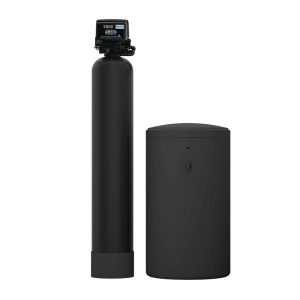
Why It Wins: This is a premium, set-it-and-forget-it system built for performance. It uses high-quality components and an industry-leading warranty. For homes with aggressive chloramines, I recommend pairing it with SpringWell’s whole-house carbon filter (CF1) for ultimate protection. Note that a simple sediment pre-filter is always a good practice to protect the control valve.
- High-efficiency upflow regeneration saves salt and water.
- Durable 10% crosslink resin is standard, perfect for city water.
- Bluetooth control head for convenient monitoring.
#2 Pick: SoftPro Elite High-Efficiency
#3 Pick: Fleck 5810 SXT
#1 Pick (Retail):
Whirlpool WHESFC Pro Series Hybrid
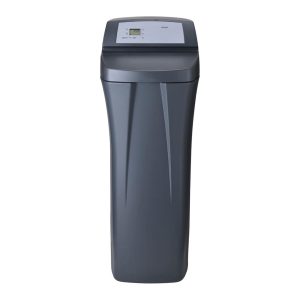
Why It Wins: This is a smart choice for city water from a big-box store, largely because it’s a “2-in-1” hybrid that also filters chlorine. It’s worth noting that its sibling model, the Whirlpool WHES40E, was named the best overall salt-based softener by Better Homes & Gardens for its exceptional value and performance.
- Hybrid design: softener + whole-house carbon filter.
- “Demand Initiated Regeneration” learns your water usage.
- Reduces chlorine taste and odor without needing separate cartridges.
#2 Pick: Rheem PREFERRED Platinum RHS42
#3 Pick: Morton M34
#1 Pick (Pro Dealer Channel):
System based on
Clack WS1
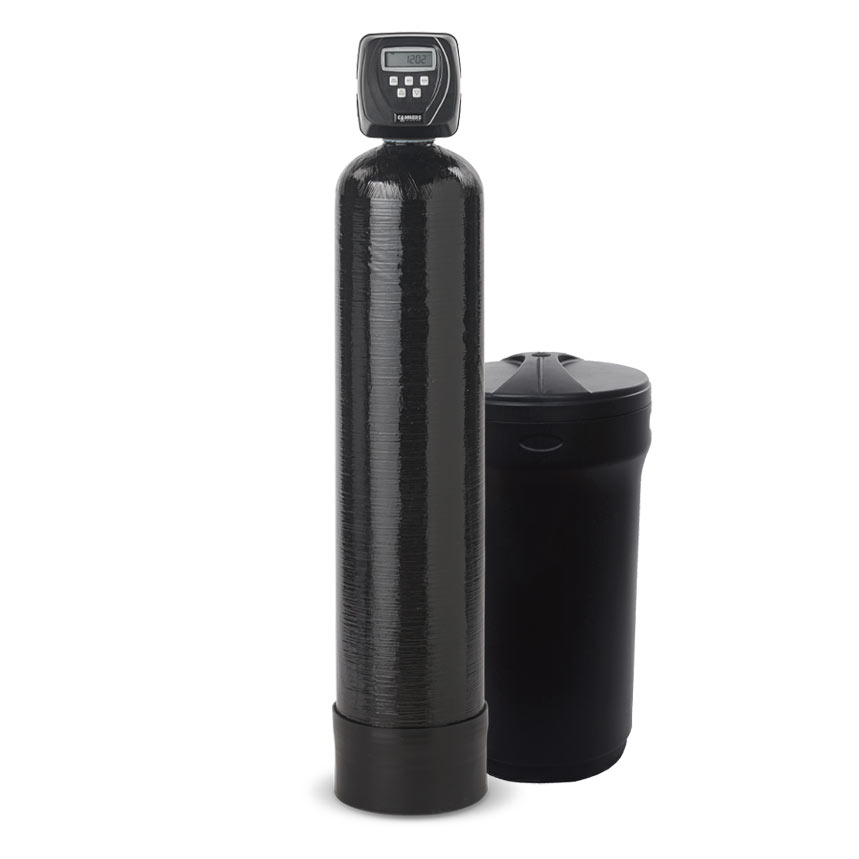
Why It Wins: This is the gold standard for professionals. The Clack WS1 valve is legendary for its reliability and efficiency. Paired with high-durability 10% crosslink resin by a local expert, it offers unparalleled peace of mind and performance for chlorinated city water.
- Industry-leading reliability and serviceability.
- Sold and installed by certified water treatment specialists.
- Advanced diagnostics for easy professional maintenance.
#2 Pick: Hellenbrand ProMate 6
#3 Pick: Vesta Water Softener
Category 2: The Well Water Warrior
The Challenge: Hardness + Dissolved Iron (up to 3 PPM), which requires specialized resin — a key feature in the best water softeners for well water.
#1 Pick (Online/DTC):
SoftPro Elite
for Well Water
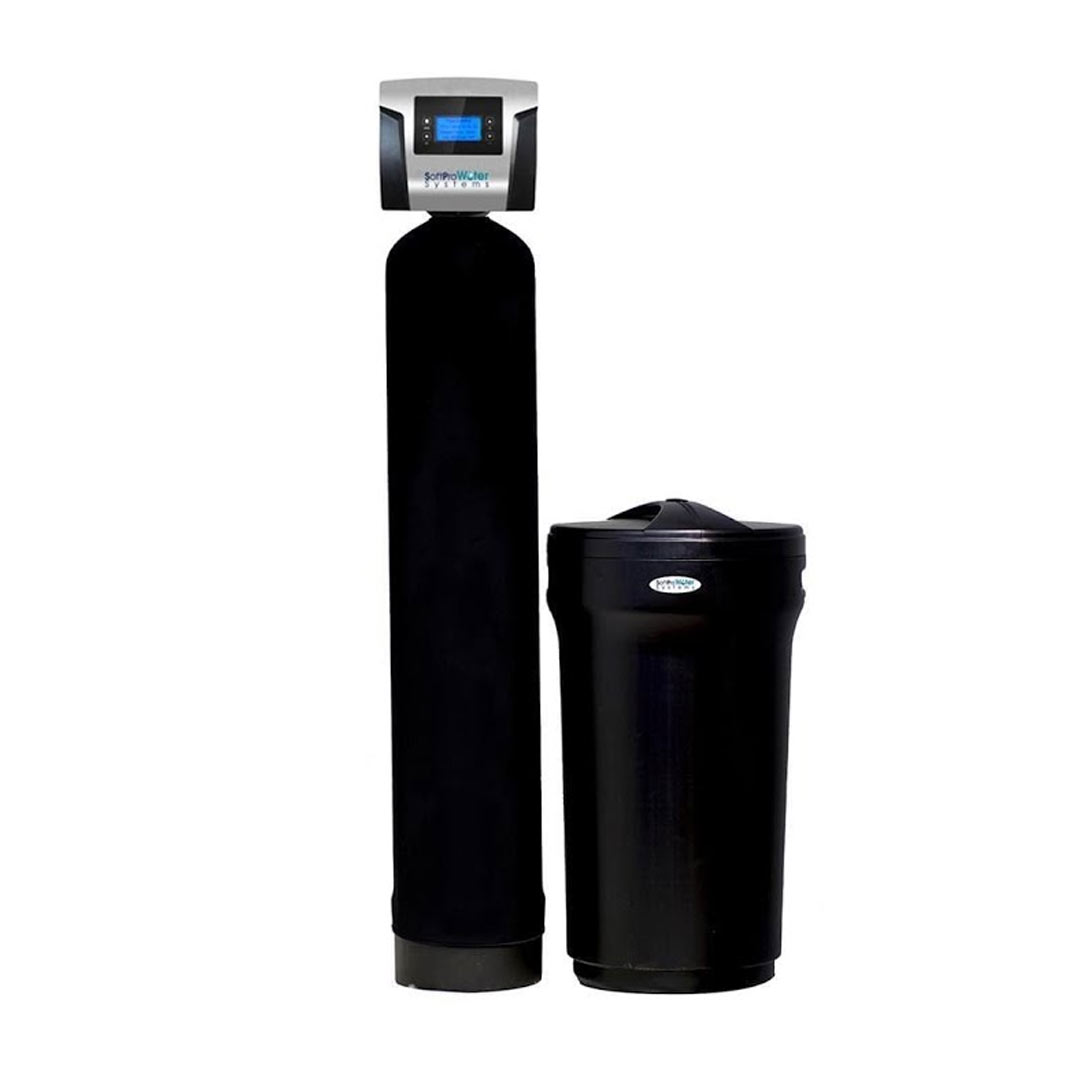
Why It Wins: This is a purpose-built machine for well water, using Fine Mesh Resin and upflow regeneration to remove both hardness and iron. The digital head offers great flexibility. For well water, remember that a sediment pre-filter is often necessary to protect the fine mesh resin and control valve from grit and sand.
- High-capacity Fine Mesh Resin specifically for iron removal.
- Efficient Upflow regeneration saves a significant amount of salt and water.
- Backed by a lifetime warranty on the tanks and valve.
#2 Pick: SpringWell WSS1
#3 Pick: Fleck Iron Pro 2
#1 Pick (Retail):
Aquasure Harmony
Fine Mesh Series
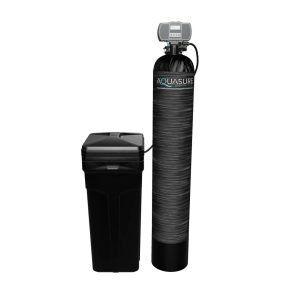
Why It Wins: Aquasure is one of the few brands offering a true Fine Mesh system through a major retailer like Home Depot. This isn’t just a standard softener; it’s the specific “FM” (Fine Mesh) model designed to tackle clear-water iron, making it the best in-store choice for well water homeowners who need more than just softening.
- True Fine Mesh Resin for superior iron removal.
- Digital control head with on-demand regeneration.
- Provides a retail option for a specialized well water solution.
#2 Pick: Rheem PREFERRED Plus RHS44
#3 Pick: WaterBoss 900IF
#1 Pick (Pro Dealer Channel):
Clack WS1 with
Fine Mesh Resin

Why It Wins: For well water with iron, professionals combine the bulletproof Clack WS1 valve with specialized fine mesh resin. This creates the ultimate “done-for-you” solution, expertly configured by a local dealer to tackle both extreme hardness and stubborn iron staining with maximum efficiency.
- The most reliable valve paired with specialized iron-removing resin.
- Custom-configured based on your specific water analysis.
- Professional installation and service ensure optimal performance.
#2 Pick: Water-Right Impression Series
#3 Pick: Hague WaterMax
Category 3: The Budget-Friendly Workhorse
The Challenge: Standard hardness, a tight budget, and the desire for maximum reliability over fancy features.
#1 Pick (DIY Classic):
Fleck 5600SXT
System
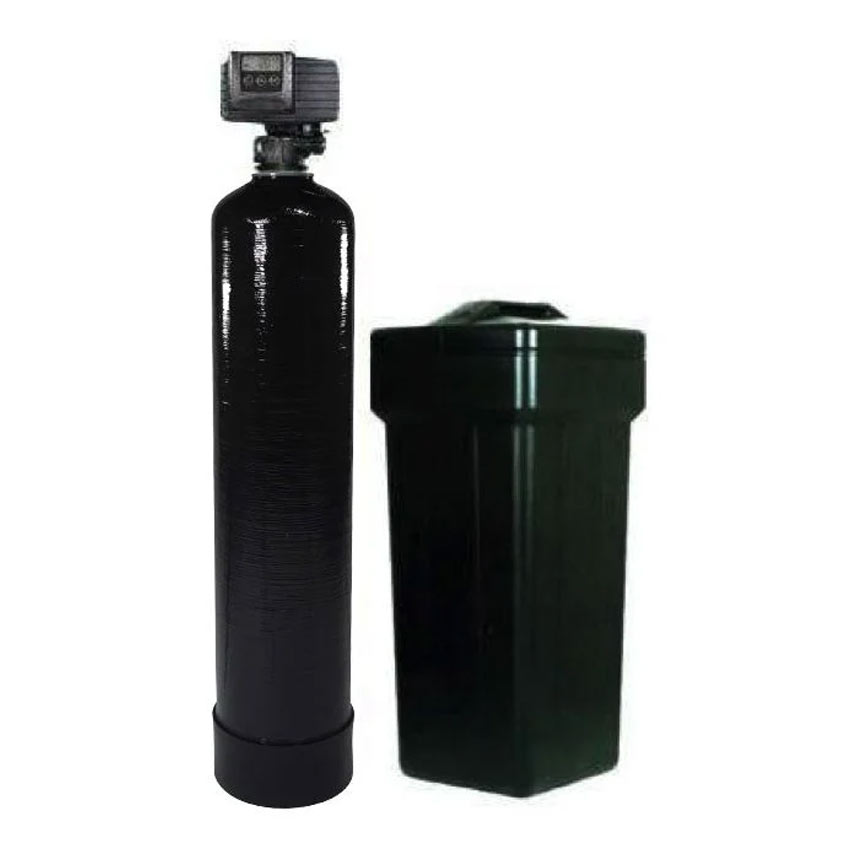
Why It Wins: This is less of a brand and more of a legendary component combination. The Fleck 5600SXT valve is arguably the most reliable, simple, and serviceable control head ever made. Paired with a high-quality tank and resin, it’s the most durable and cost-effective system a DIYer can build.
- Legendary reliability and incredibly simple mechanics.
- Endless supply of affordable parts and online tutorials.
- The best long-term value in water softening, period.
#2 Pick: Genesis 2 Premier
#3 Pick: US Water Systems Fleck 5600SXT
#1 Pick (Retail):
Rheem PREFERRED
RHS32
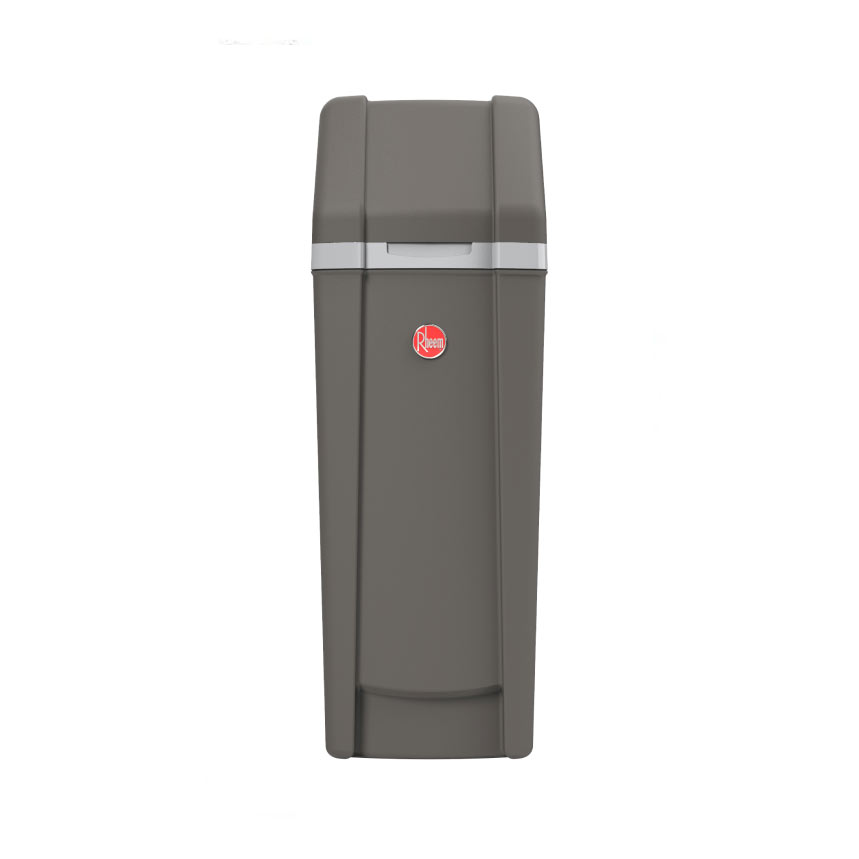
Why It Wins: When it comes to the lowest upfront cost from a major brand, the Rheem 32,000-grain softener is the leader at Home Depot. It includes smart features that are rare at this price point, like technology that learns your water usage patterns to save salt. It’s a fantastic entry-level choice for smaller households.
- Excellent upfront value from a trusted brand.
- “Learning Technology” adapts regeneration to your usage.
- Widely available and frequently on sale at Home Depot.
#2 Pick: GE Appliances GXSHC40N
#3 Pick: Morton M30
#1 Pick (Pro Dealer Channel):
System based on
Autotrol 255/760
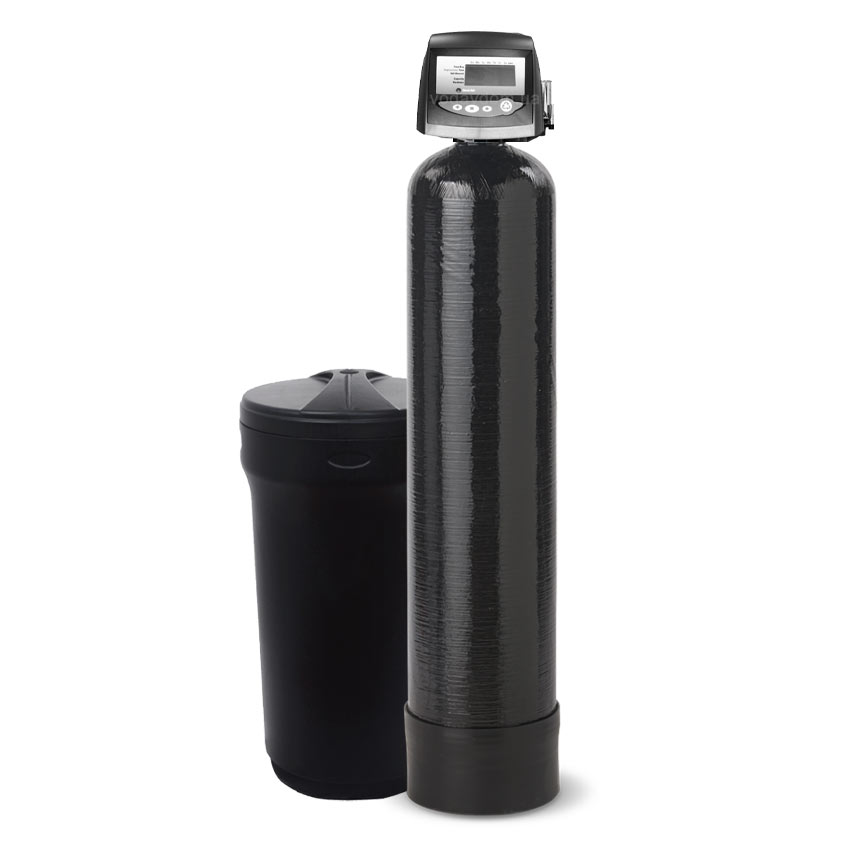
Why It Wins: Before Fleck dominated the DIY scene, Autotrol valves (also owned by Pentair) were the workhorses of the dealer world. Many local pros still prefer them for their simple, durable design. A system built on an Autotrol valve by a local dealer offers professional reliability at a great value.
- Proven, time-tested reliability from a trusted Pentair brand.
- Simple, robust mechanics mean fewer service calls.
- A great value option from a professional installer.
#2 Pick: “House Brand” from local dealer
#3 Pick: System based on Clack WS1TC
Category 4: The “No Salt” Solution
Important: These are water conditioners, not softeners. They do not remove hardness minerals, but they are highly effective at preventing scale buildup.
#1 Pick (Online/DTC):
SpringWell FutureSoft
FS1
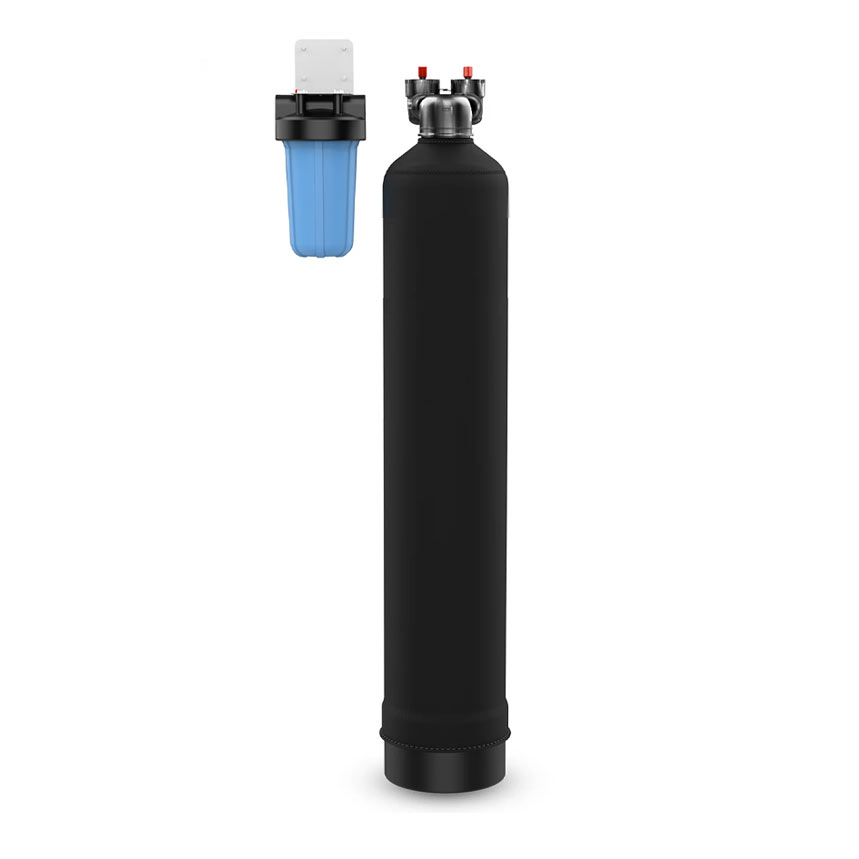
Why It Wins: SpringWell uses Template Assisted Crystallization (TAC) technology, which is widely considered the most effective non-salt method for preventing scale. The FutureSoft requires zero electricity, wastes no water, and the media lasts for years. It’s the top online choice for a maintenance-free scale prevention solution.
- Uses highly effective Template Assisted Crystallization (TAC) media.
- Zero electricity, zero wastewater, and zero maintenance.
- Excellent flow rates that won’t impact your water pressure.
#2 Pick: SoftPro Elite Salt-Free Conditioner
#3 Pick: US Water Systems GreenWave
#1 Pick (Retail):
Pentair Pelican
NaturSoft Series
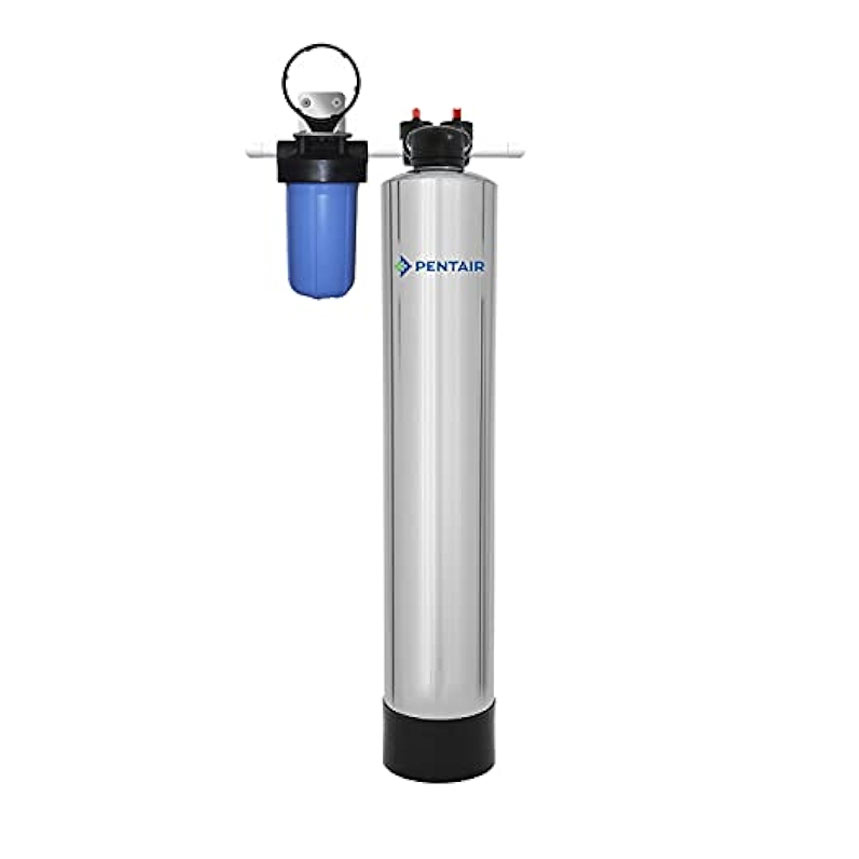
Why It Wins: Pelican (now owned by Pentair) pioneered the consumer TAC market and is one of the most recognized brands in the salt-free space. Their NaturSoft system is the only salt-free system certified by DVGW 9191 to prevent 99.6% of scale buildup, a German standard that is the benchmark for this technology. It’s the most trusted retail option.
- The only system with third-party DVGW 9191 certification.
- Proven 99.6% scale prevention rate.
- Requires no electricity and wastes no water.
#2 Pick: AO Smith AO-WH-DSCLR
#3 Pick: Aquasana EQ-1000-AST
#1 Pick (Pro Dealer Channel):
Watts
OneFlow
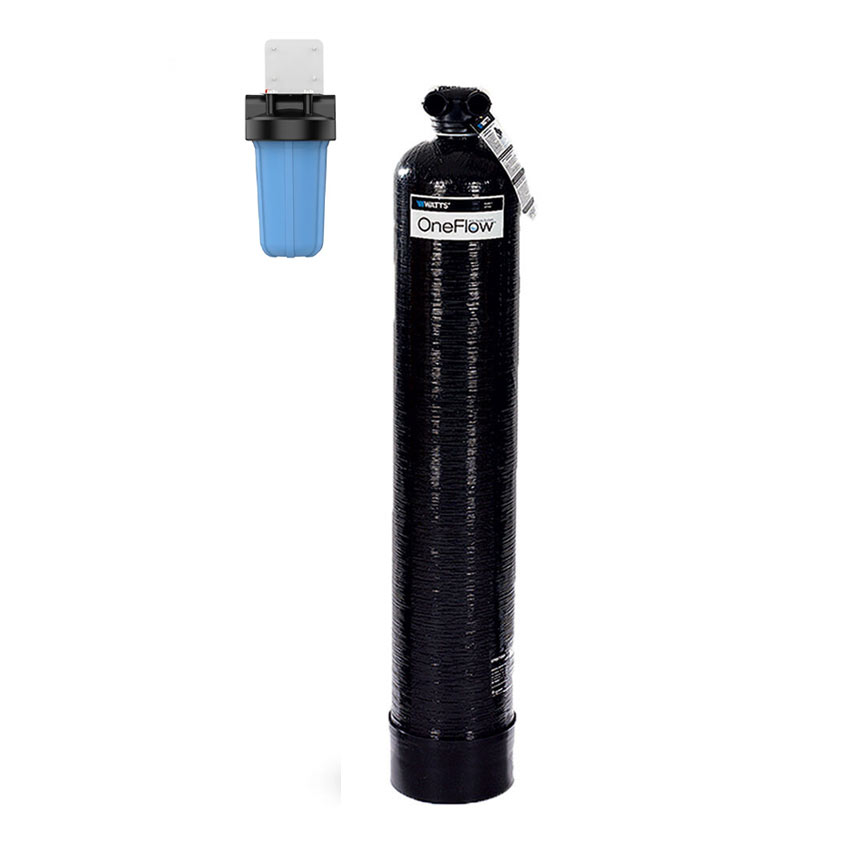
Why It Wins: Watts is a giant in the commercial plumbing and water quality industry, and their OneFlow system is one of the most trusted TAC technologies among professionals. It’s a robust, certified solution for scale prevention chosen by plumbers for its proven effectiveness and commercial-grade build.
- Trusted commercial-grade TAC technology.
- Third-party certified for scale prevention (DVGW-9191).
- A go-to choice for professional plumbers and installers.
#2 Pick: Vesta TAC System
#3 Pick: Water-Right ONE Scale Control System
The brand name on the sticker is the last thing you should look at.
Let’s be honest—the water softener market is designed to be a confusing mess. When you first start shopping, you’re hit with a wall of familiar names: Whirlpool, GE, Rheem, Morton… a dozen brands fighting for your attention at Home Depot, Lowe’s, and on Amazon. The entire market is built to make you choose a familiar logo, not the best water softeners with the right technology.
But today, I’m going to let you in on the single biggest secret of the water treatment industry.
The quality, reliability, and efficiency of your water softener have almost nothing to do with the logo on the front. It’s all about what’s inside. Most of these consumer brands don’t manufacture the critical components; they build their systems using “engines” developed by a handful of industrial titans. Understanding this difference is the first step from being a confused consumer to an informed expert.
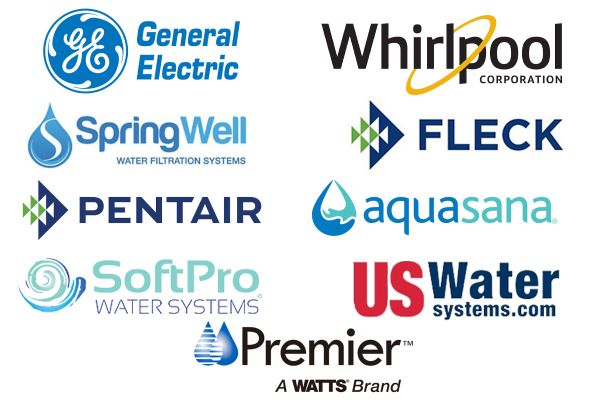
The Industrial Titans: The Real Names That Power 80% of the Industry
These are the companies the pros talk about. You won’t see their names on a box at your local hardware store, but their technology is the reason a system works flawlessly for 15 years… or fails after three.
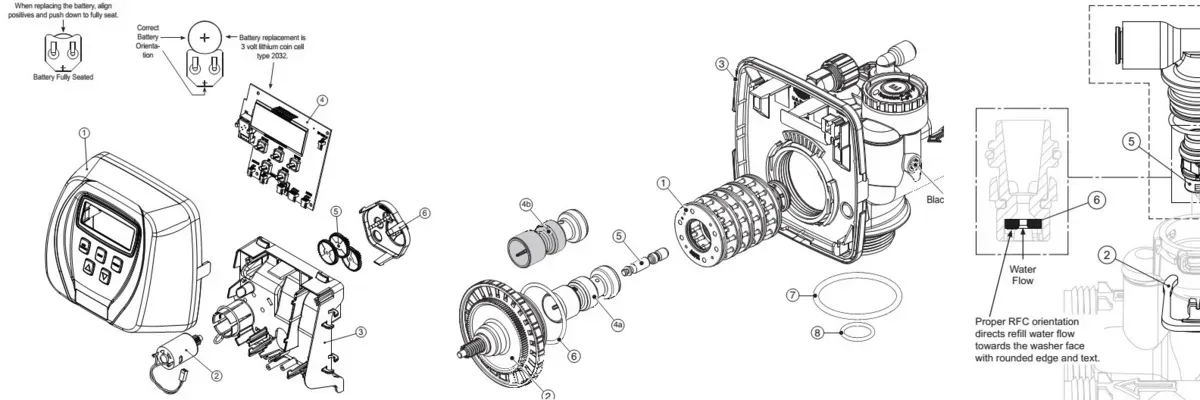
Clack Corporation:
The Professional’s Benchmark

Made in Wisconsin, Clack valves (like the legendary WS1) are considered the gold standard by a huge number of independent water treatment specialists. They are known for their bulletproof reliability, incredible efficiency, and advanced diagnostic features that make them easy for a pro to service. They are sold exclusively through a network of certified professionals.
Pentair (Fleck & Autotrol):
The Industry Workhorse

Pentair is the largest and most well-known player in the game. Their Fleck control valves are the indestructible engines of the industry—the famous Fleck 5600SXT has been a favorite of DIYers and pros for decades due to its simple, mechanical reliability. Pentair also owns the Autotrol line, another family of trusted valves.
Canature / WaterGroup:
The Innovator

This Canadian/US manufacturer is a powerful and respected innovator in the industry. Their valves are prized for their high-quality build, efficient engineering, and are rapidly gaining market share as a top-tier alternative to the other titans.
My Expert Takeaway: Judge a water softener by its Control Valve and its Resin, not by the logo on the tank. If a system is built using components from one of these industrial titans, you’re already on the right track.
The Consumer Market Map: Who’s Who on the Shelves
So, where do all the brands you see at the store fit into this picture? Now that you know about the “engines,” we can put everyone on the map. I break the consumer market down into four main groups.
1. The Big-Box Giants
Includes: Whirlpool, GE Appliances, Rheem, A.O. Smith, Morton, Kenmore, EcoPure, North Star.
What It Means for You: These are the systems you’ll find on the shelves at Home Depot, Lowe’s, etc. They are designed for accessibility and affordable upfront pricing. The trade-off is that they often use their own proprietary (and often simpler) control valves and typically come with shorter warranties on the electronics (1-3 years).
2. The Direct-to-Consumer (DTC) Specialists
Includes: SpringWell, SoftPro, Aquasure, AFWFilters, Tier1.
What It Means for You: These companies sell high-performance systems directly to you online. Their key advantage is that they build their softeners using professional-grade components (like Fleck control valves) and superior resin, offering top-tier quality without the high price tag of a traditional dealer.
3. The Traditional Dealer Networks
Includes: Culligan, Kinetico, Hague Quality Water, Rainsoft.
What It Means for You: This is the “old guard” of the water industry. You don’t just buy a product; you buy a complete “done-for-you” service package from a local dealer, from testing to installation and maintenance. Their systems, especially the non-electric Kinetico units, are technologically unique but come with a higher price tag and less transparency.
4. Niche & Specialty Players
Includes: WaterBoss, On The Go.
What It Means for You: These brands solve specific problems. WaterBoss excels at making ultra-compact cabinet-style units for tight spaces where a traditional system won’t fit. On The Go specializes in portable softeners designed for RVs and mobile homes.
Brands Discussed in This Section
Industrial Manufacturers
- Clack Corporation
- Pentair (Fleck & Autotrol)
- Canature / WaterGroup
Big-Box Retail Brands
- Whirlpool
- GE Appliances
- Rheem
- A.O. Smith
- Morton
- Kenmore
- EcoPure
- North Star
DTC & Dealer Brands
- SpringWell
- SoftPro
- Aquasure
- AFWFilters
- Tier1
- Culligan
- Kinetico
- Hague
- Rainsoft
Specialty Brands
- WaterBoss
- On The Go
The Brain of the System: A Pro’s Guide to the Control Valve
Now we get to the part that really matters. If the resin is the heart, the control valve is the brain and the engine combined. It measures your water usage, decides when to regenerate (clean) itself, and directs the flow of water through all its cycles. Its quality single-handedly determines the efficiency and reliability of your entire system.
The #1 Factor You Should Care About: Upflow vs. Downflow Regeneration
When a softener regenerates, it uses a saltwater brine solution to wash the collected hardness minerals off its resin beads, sending them down the drain. How it performs this wash is the key difference that separates the best water softeners from old-school tech.
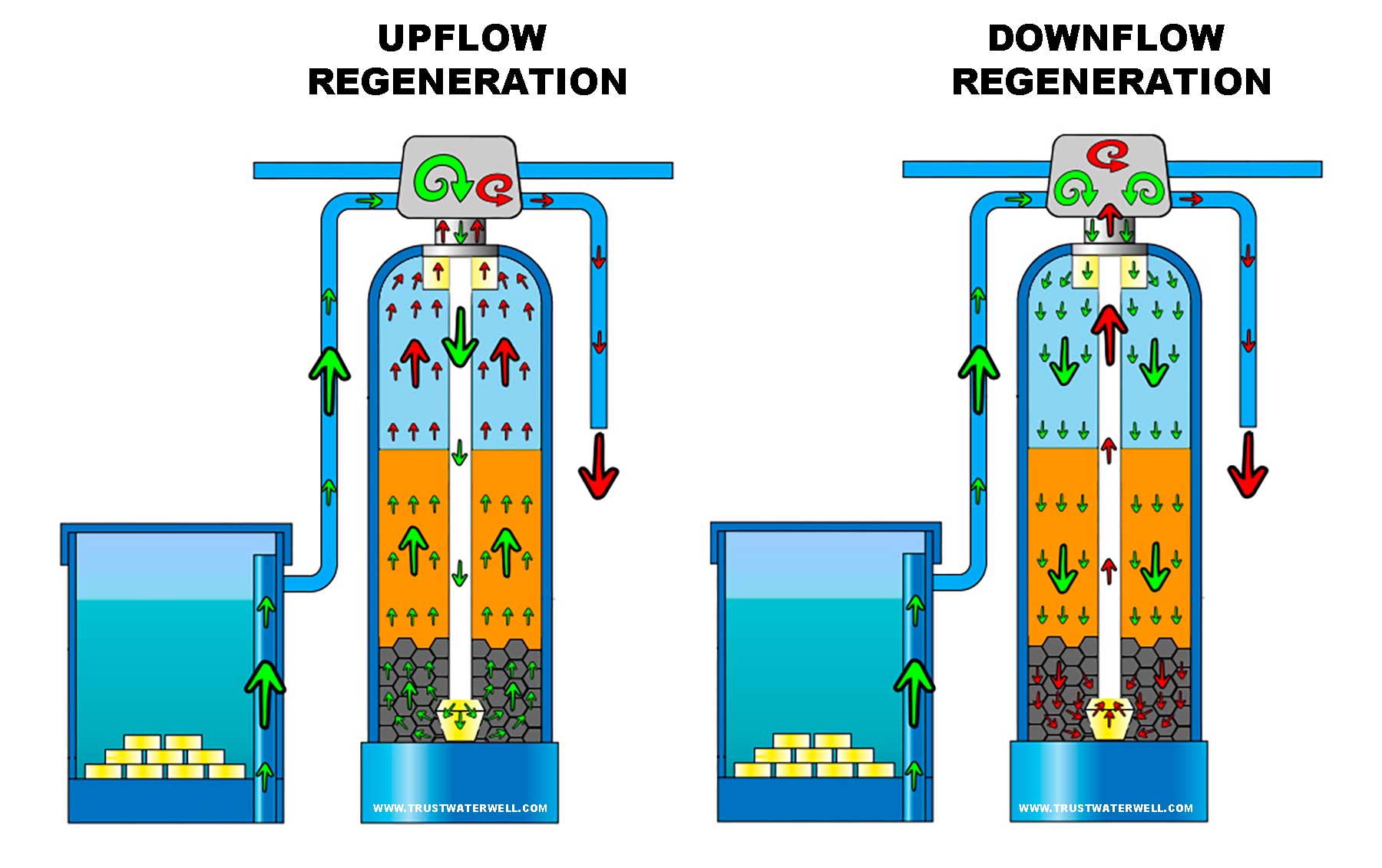
Downflow Regeneration: The Old Way
This is the classic, brute-force method. The brine solution is pushed down from the top of the resin tank, regenerating the beads from top to bottom. The problem? The beads at the top are the least exhausted, while the most exhausted beads at the bottom get regenerated last with a diluted brine. It’s like washing your dirtiest dishes last with already-dirty water—inefficient and wasteful.
Upflow Regeneration: The Modern, High-Efficiency Method
This is the smarter, modern approach. The brine is pushed up from the bottom of the tank, regenerating the most exhausted resin beads first with the most concentrated brine solution. This uses the absolute minimum salt and water needed to get the job done, preserving the lifespan of the resin and saving you money.
Key Benefit: Upflow systems can use up to 75% less salt and 64% less water per regeneration cycle.
The Names the Pros Trust: Meet the ‘Engines’ You’ll Find in the Best Systems
While there are dozens of valve designs, the professional market is dominated by a few key players known for their outstanding engineering and reliability. If you see one of these “engines” in a system, you know you’re looking at quality.
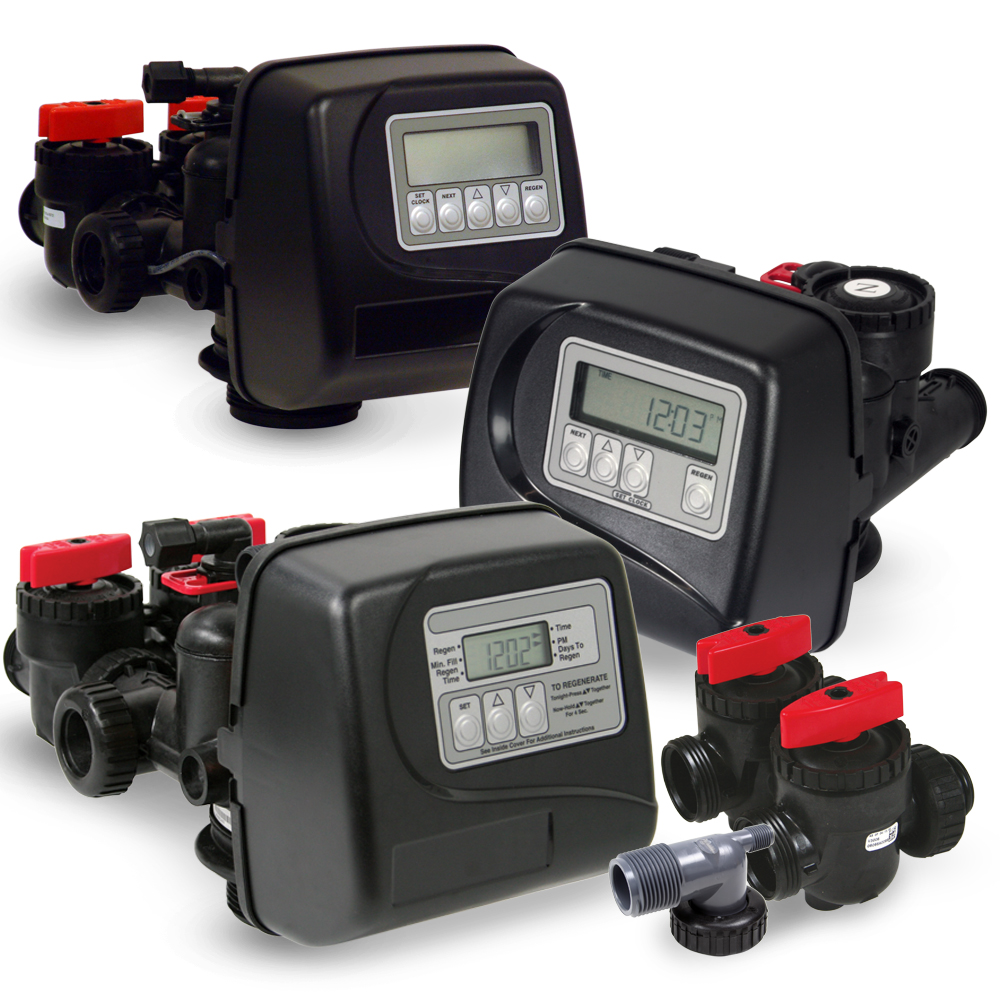
Clack WS1 Series
The undisputed gold standard for many independent professionals. Prized for its simple, reliable design with fewer moving parts, advanced diagnostics, and Made-in-USA build quality.
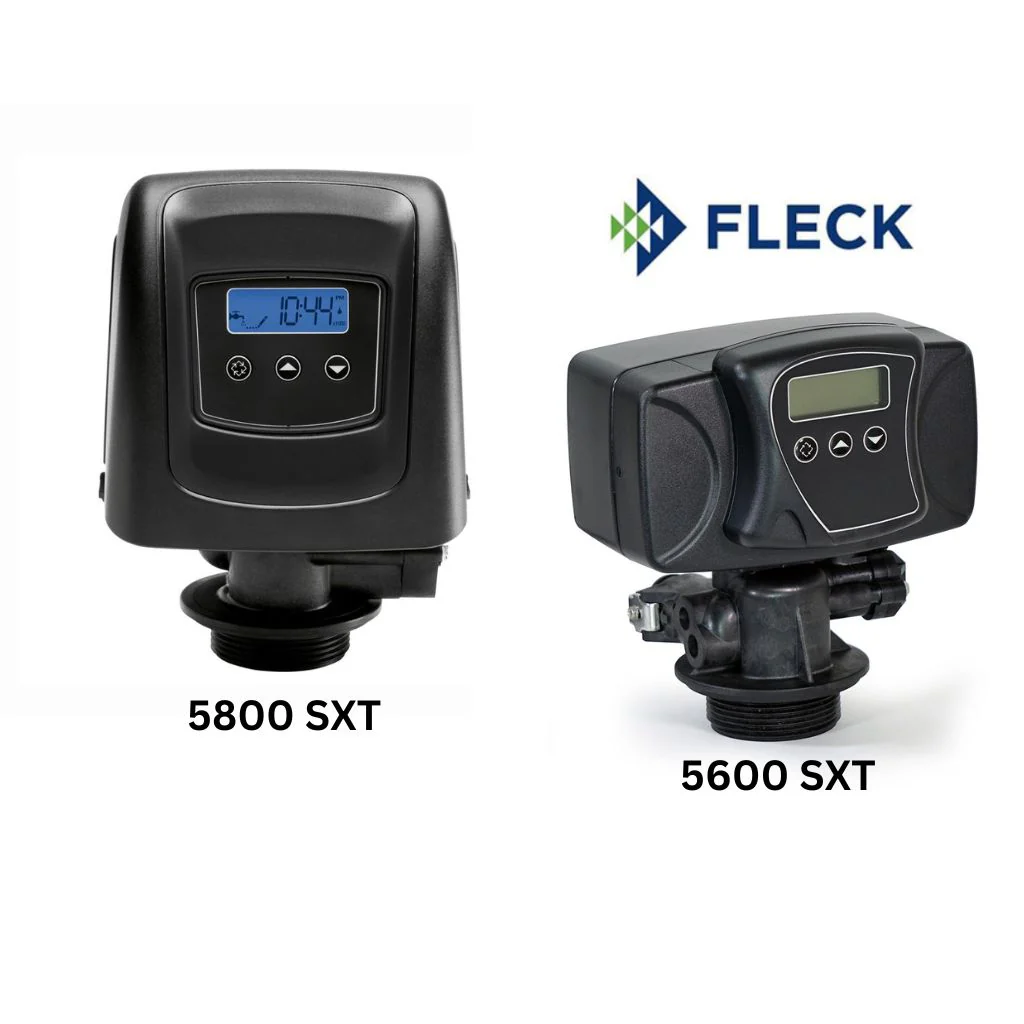
Pentair / Fleck 5800 & 5600 Series
The industry’s most trusted workhorses. The 5600SXT is a legend of mechanical simplicity and durability, perfect for DIY builds. Higher-end models like the 5810 offer modern features and greater efficiency.
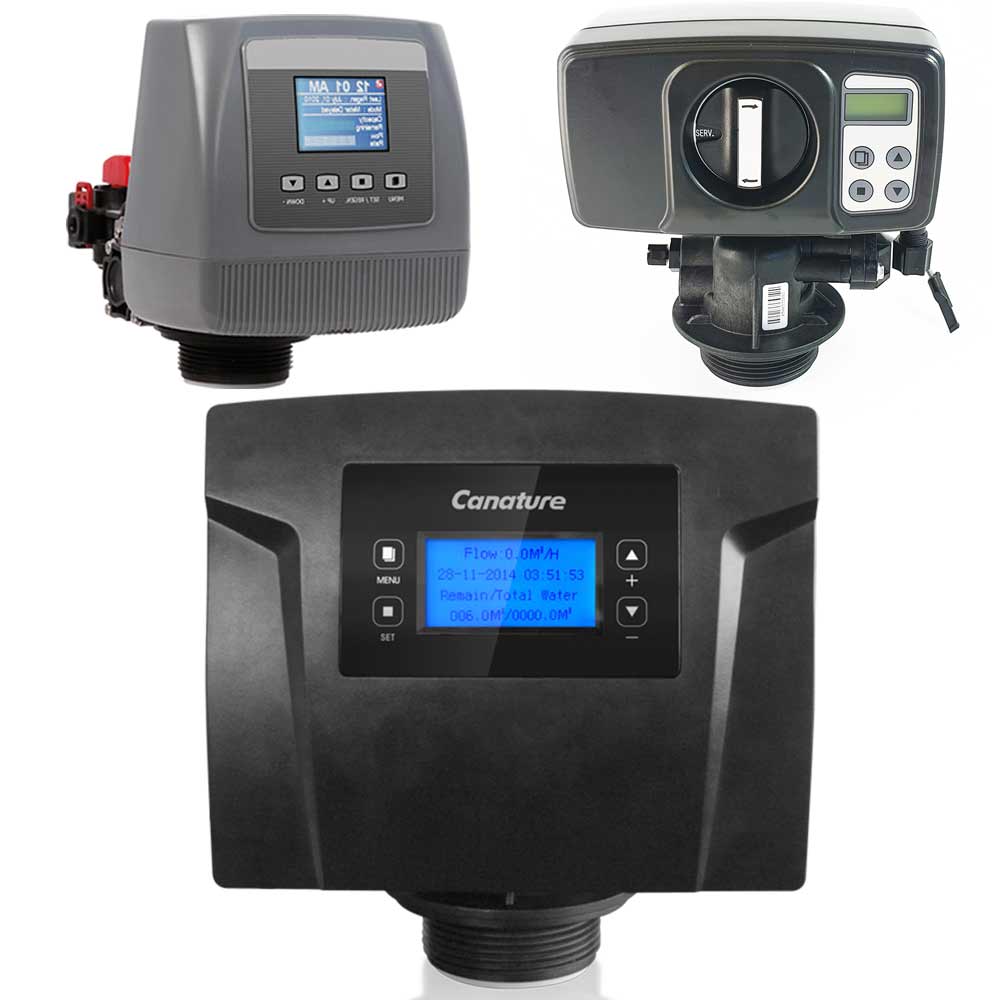
Canature Valves
A rapidly growing force in the market, known for excellent engineering and innovative features. They are a top-tier choice that combines reliability with modern, efficient performance.
My Professional Opinion: After servicing hundreds of systems over the years, I stake my reputation on systems built with Clack and modern Pentair (5800 series and up) valves. The peace of mind that comes from fewer service calls is everything—both for me and for my clients.
The Heart of the System: Why the Right Resin Can Double Your Softener’s Lifespan
If the control valve is the brain, the ion-exchange resin is the tireless heart of your system. These are the millions of microscopic, porous beads that perform the actual magic of ion exchange—grabbing the hard minerals out of your water. But just like with every other component, not all resin is created equal.
You don’t need to know dozens of industrial brands like DuPont, Purolite, or ResinTech. You only need to understand two key parameters that determine 95% of your system’s performance and longevity. Getting this right is the difference between a system that lasts 5 years and one that lasts 15.
1. Resin Durability: 8% vs. 10% Crosslink for Chlorinated City Water
Think of it like a tire. A standard tire is great for normal driving, but a heavy-duty, reinforced tire is built to withstand rough conditions. Water softener resin works the same way through its “cross-linking.” This number tells you how durable the resin bead is and how well it can stand up to oxidizing agents like chlorine, which is present in almost all city water.
- Standard 8% Crosslink Resin: This is the “standard tire.” It’s effective and used in most budget and big-box retail systems. However, chlorine slowly breaks it down, reducing its capacity and lifespan.
- High-Durability 10% Crosslink Resin: This is the “heavy-duty, reinforced tire.” The higher crosslink percentage makes the beads physically stronger and far more resistant to chlorine damage.
Expert Tip: For city water, investing in 10% crosslink resin is a non-negotiable. It is the single most effective upgrade to ensure your system performs at peak capacity for 10-15 years, not just 5-7.
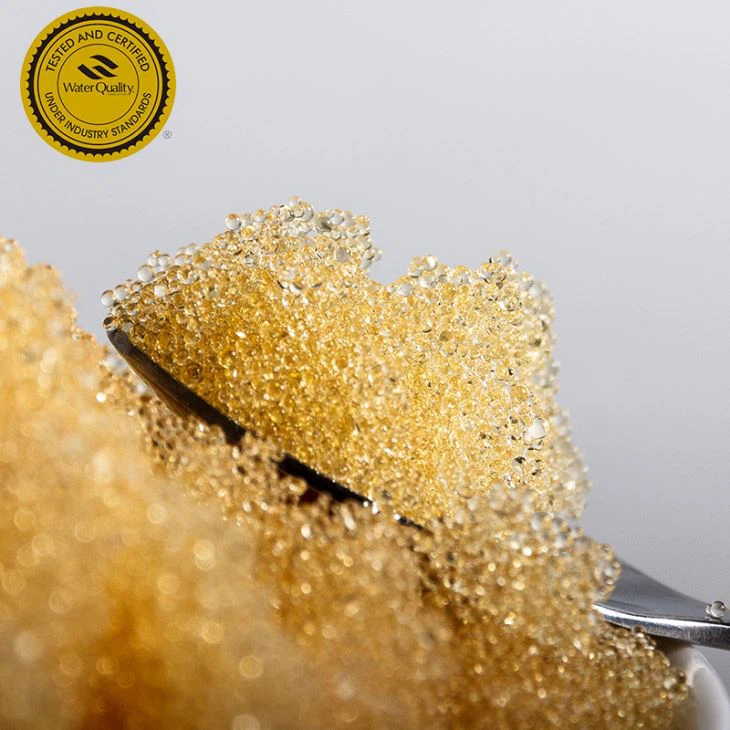
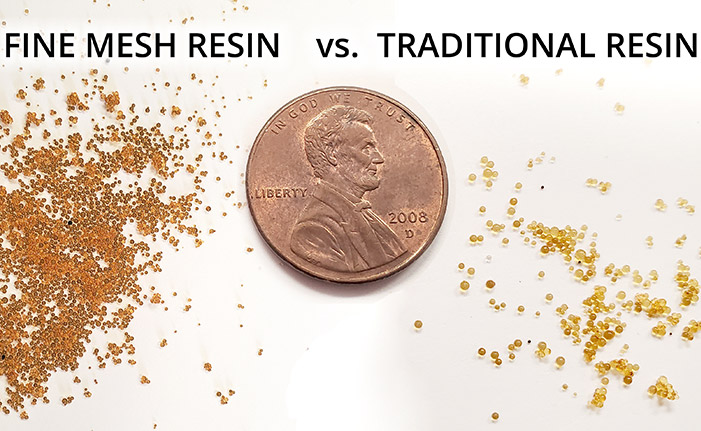
2. Resin Precision: Standard vs. Fine Mesh for Well Water With Iron
Now, let’s switch analogies. Think of resin like a fishing net. A standard net is great for catching large fish (calcium and magnesium), but smaller critters (like iron) can slip right through.
- Standard Resin: This “net” is perfectly sized to capture the hardness minerals that are the primary cause of scale and soap scum.
- Fine Mesh Resin: This is a “finer-meshed net.” The resin beads are physically smaller and packed more densely together. This gives them a greater surface area, making them far more effective at trapping smaller dissolved iron particles—the kind that leaves those ugly red/orange stains on your fixtures and appliances.
Expert Tip: If your well water test shows dissolved iron (up to 3-4 PPM), a system with Fine Mesh Resin is absolutely essential. It’s the only way to effectively tackle both hardness and iron staining with a single tank.
My Pro Cheat-Sheet: The Only Resin Guide You’ll Ever Need
Let’s boil it all down into a simple guide. Find your situation below to know exactly what to look for.
| Your Situation | The Problem | Recommended Resin Type | Where to Look for It |
|---|---|---|---|
| City Water | Hardness + Chlorine | 10% Crosslink SAC* | Premium DTC brands and professional installations. |
| Well Water | Hardness + Dissolved Iron | Fine Mesh Resin | Specialized online systems and DIY configurations. |
| Budget / Standard Hardness | Only Hardness (No Chlorine/Iron) | Standard 8% Crosslink SAC* | Most big-box retail and budget-friendly systems. |
| *SAC = Strong Acid Cation, the standard type of resin used for softening. | |||
Resin Manufacturers Discussed in This Section
While you shop for the type of resin, these are some of the major industrial brands behind the technology:
- DuPont (DOWEX/Amber)
- Purolite
- ResinTech
The Body of the System: Choosing the Right Tanks & Housing
The final piece of the hardware puzzle is the body itself—the tanks that hold the resin and the salt. While they might just seem like simple plastic containers, their design determines where you can install your system, how easy it is to service, and how durable it will be over the long haul. The choice boils down to one key decision.
The Two Main Body Styles: A Battle of Space vs. Flexibility
Your home’s layout will likely make this decision for you. Let’s look at the pros and cons of each.
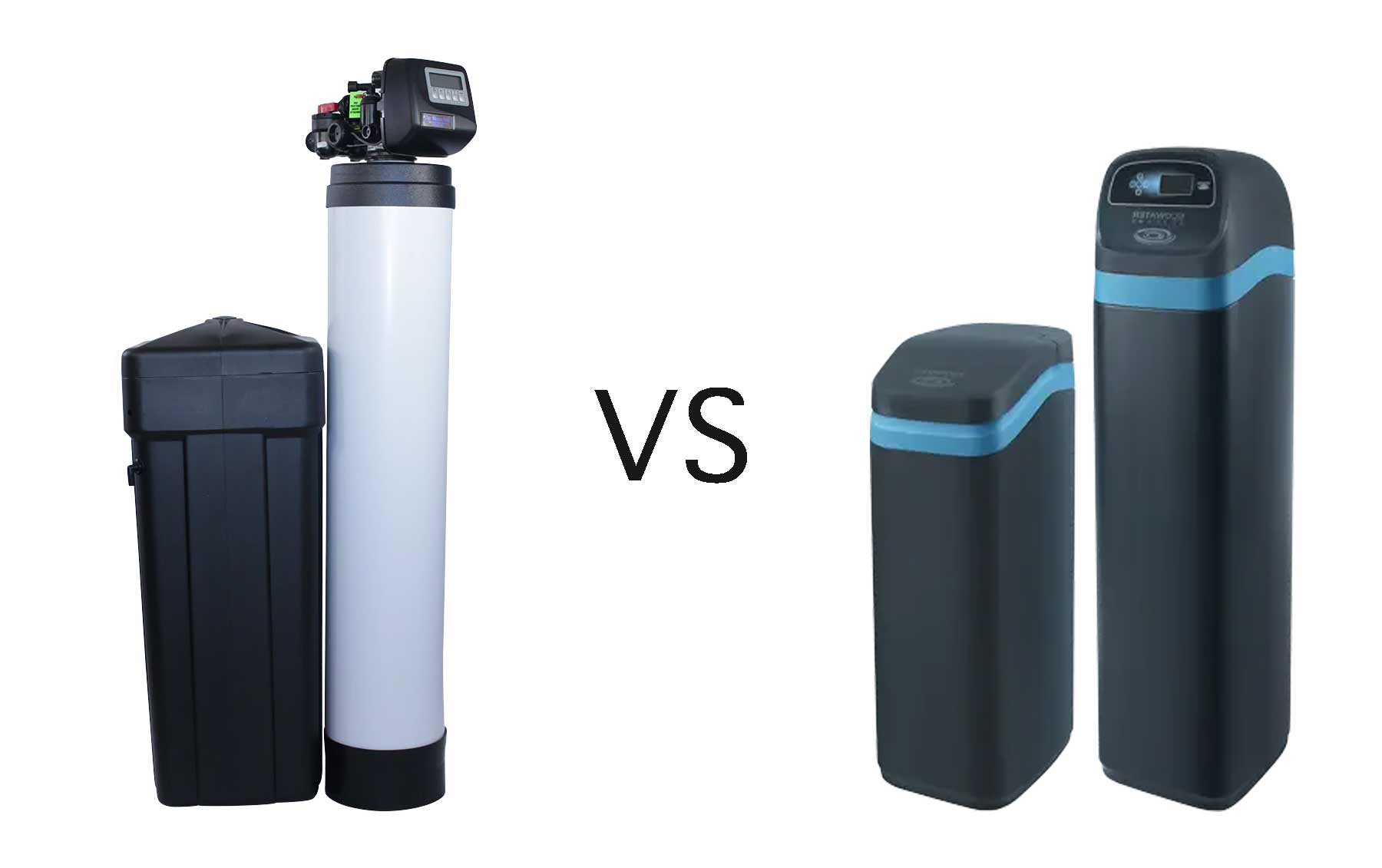
Style 1: The Classic Two-Tank System (The Pro’s Choice)
This is the most common configuration for a reason. You have two separate components: a tall, narrow mineral tank for the resin, and a shorter, wider brine tank for the salt.
- Pro: Maximum flexibility for installation in garages or basements.
- Pro: Easier to service, clean, and replace individual components if ever needed.
- Pro: Typically offers a larger capacity, making it ideal for most families and homes.
- Con: Requires more total floor space than a single-unit design.
Style 2: The All-in-One “Cabinet” System (The Space Saver)
In this design, the mineral tank is placed inside the brine tank, and both are housed within a single, sleek plastic “cabinet.”
- Pro: Extremely compact footprint, perfect for tight spaces like closets, utility rooms, or apartments.
- Pro: Often has a cleaner, more appliance-like appearance.
- Con: Can be more difficult to clean the brine tank or service internal components.
- Con: Usually has a smaller resin and salt capacity.
My Professional Advice: If you have the space, a two-tank system offers better long-term value, durability, and serviceability. If space is your absolute top priority, a high-quality cabinet system from a brand like **WaterBoss** is an excellent and reliable solution.
Quality You Can See: Why Tank Material and Origin Matter
While most modern tanks are well-made, the best ones share a common construction: a durable, seamless inner shell wrapped in spun fiberglass for incredible strength. This material is often called **Polyglass**.
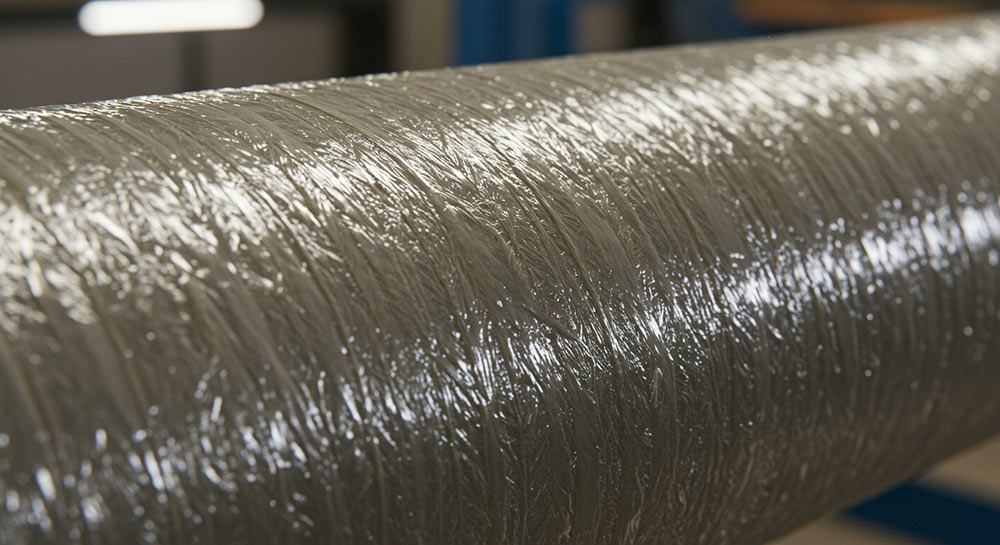
As a final mark of quality, it’s worth noting where the tank is made. **Pentair**, with its industry-leading **Structural** brand tanks, is one of the most trusted names for high-quality, long-lasting tanks. For professionals who demand the absolute best, **Clack Corporation** also manufactures their own superior-quality mineral tanks right here in the USA. Choosing a system with a tank from one of these top-tier, US-based manufacturers is an extra layer of confidence that your system is built to last.
Tank & Housing Brands Discussed in This Section
Key Manufacturers
- Pentair (Structural)
- Clack Corporation
Key Cabinet Brand
- WaterBoss
Common Retail Brands with Cabinet Options
- Rheem
- Whirlpool
- Kinetico
The Fuel for Your System: Why the Right Salt is Your First Line of Defense
Congratulations. You’ve done the hard work of choosing your system’s hardware; now let’s make sure you use the right fuel. It might seem like a small detail, but using the wrong kind of salt is the #1 cause of the most common water softener problems: clogged injectors, “salt bridges,” and a tank full of sludge.
Luckily, this is the easiest choice you’ll have to make. Let’s make it simple once and for all.
The Three Types of “Fuel”: From Premium to Problematic
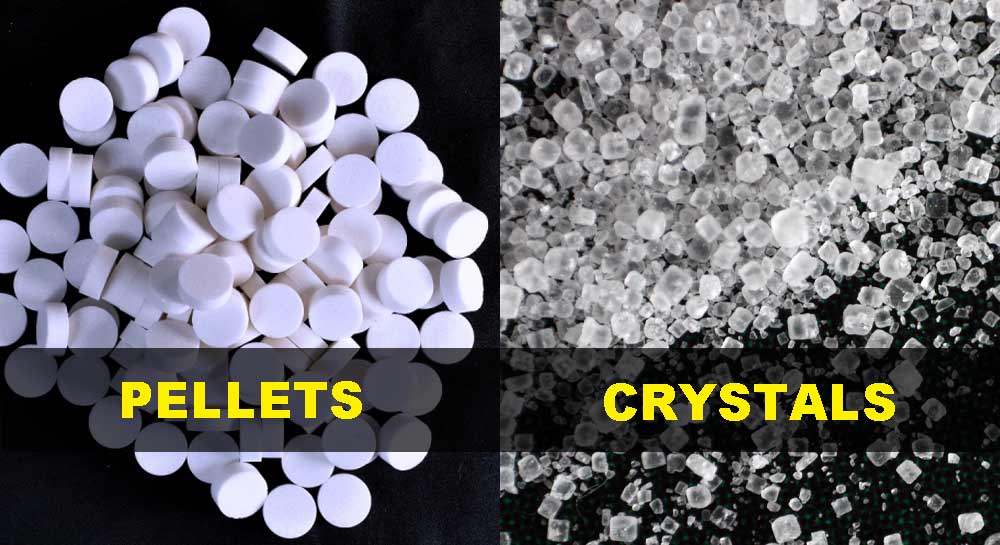
Evaporated Salt Pellets
My #1 Recommendation
This is the cleanest form of salt, up to 99.9% pure sodium chloride. It’s made by evaporating water from a brine solution, leaving behind ultra-pure salt crystals that are then compressed into pellets. It’s the “high-octane,” premium fuel for your system, leaving virtually no residue behind.
Solar Salt Crystals
The Acceptable Alternative
Made by naturally evaporating sea water, this salt is also very high purity (around 99.6%). It comes in the form of crystals instead of pellets. It’s a perfectly good, slightly more budget-friendly option, but can sometimes leave a bit more sediment at the bottom of your brine tank over time.
Rock Salt
The One to Avoid
This is mined salt in its most basic form, the same stuff used on icy roads. It’s cheap for a reason—it contains a high level of insoluble minerals and impurities. This dirt will build up into a thick sludge in your tank, eventually clogging your system and potentially leading to a costly service call.
Warning: The few dollars you save on rock salt are not worth the risk of damaging your system’s control valve.
The Two Names That Dominate the Market
When you’re standing in the aisle at Home Depot or Lowe’s, don’t get overwhelmed by all the bags. 90% of the US consumer market is controlled by two giants:
- Morton Salt: The iconic brand in the blue bag. Their “System Saver II” and “Clean & Protect” pellets are the industry standard.
- Diamond Crystal (by Cargill): The other major player, usually in a red bag. Their “Bright & Soft” pellets are a direct and equally high-quality competitor.
Essentially, if you stick with pellets from either of these two brands, you can’t go wrong.
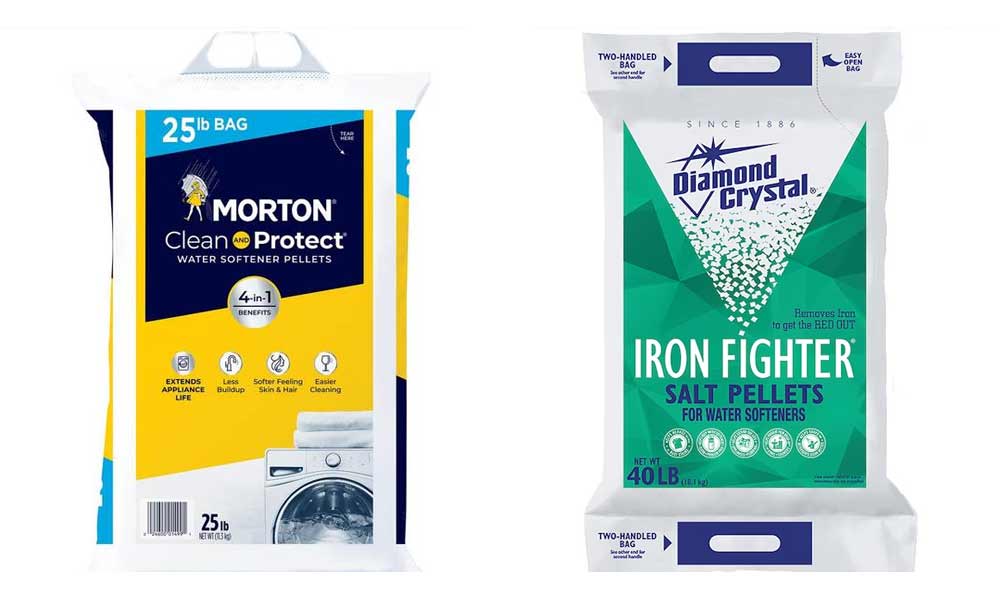
What About Potassium Chloride?
You may see bags of Potassium Chloride (KCl) marketed as a salt-free, eco-friendly alternative. While it works, it comes with significant trade-offs: it’s 3-4 times more expensive, less efficient than salt (meaning you need more of it), and has a greater tendency to clump and create service issues. Unless you are on a strict, doctor-ordered, low-sodium diet, I strongly recommend sticking with high-purity salt pellets for the best performance and value.
Salt Brands Discussed in This Section
Major Brands
- Morton Salt
- Diamond Crystal (Cargill)
Common Sub-Brands
- System Saver II
- Clean & Protect
- Bright & Soft
Sodium-Free Alternative
- Potassium Chloride (e.g., Nature’s Own)
Frequently Asked Questions
-
How long does a good water softener last?
A water softener’s lifespan depends heavily on its core components. A high-quality system with a professional-grade valve (like a Clack or modern Fleck) and durable 10% crosslink resin can easily last 15 to 20 years with minimal maintenance. Budget-friendly models from big-box stores typically last between 5 and 10 years before major components may need replacement.
-
Will a water softener make my water taste salty?
No, this is a common myth. The softening process, called ion exchange, adds a very small amount of sodium to the water, not salt (sodium chloride). The amount of sodium is medically insignificant for most people—a standard 8 oz. glass of softened water has less sodium than a slice of white bread. You will not taste any saltiness.
-
How much does it cost to install a water softener?
If you hire a professional plumber, the cost for a standard installation typically ranges from $200 to $600, depending on the complexity of your plumbing. However, many of the best direct-to-consumer systems (like SpringWell and SoftPro) are designed with DIY installation in mind, and come with excellent instructions and support, which can save you the entire cost of labor.
-
How often do I need to add salt to the tank?
This depends on your water hardness, how much water your family uses, and the efficiency of your system. For a typical family of four with moderately hard water, a modern high-efficiency softener will usually require you to add a new bag or two of salt every 6 to 8 weeks. It’s a simple task that only takes a few minutes.
-
Will a water softener reduce my home’s water pressure?
A correctly sized modern water softener will have no noticeable impact on your water pressure. Professional-grade systems are engineered with high flow rates to handle the demands of a modern household. Significant pressure loss only occurs if a system is severely undersized for the home’s plumbing and water usage, which is why proper sizing is so critical.
Your Journey to Soft Water is Almost Complete
You’ve come an incredible way. You’ve diagnosed your problem, understood the science, explored the market, and now you have a clear path forward. You’re ready to make one of the best investments you’ll ever make for your home and family. The final piece of the puzzle is ensuring you choose the perfect size for maximum efficiency.
